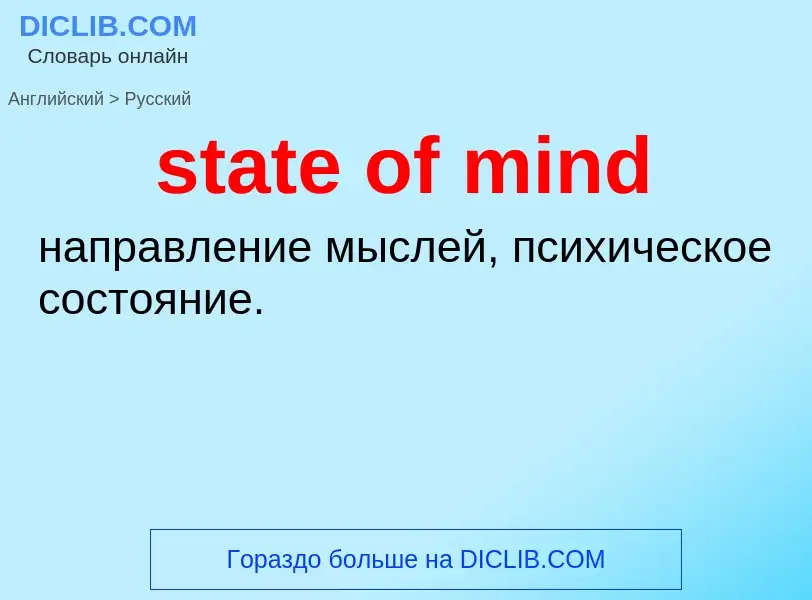Перевод и анализ слов искусственным интеллектом ChatGPT
На этой странице Вы можете получить подробный анализ слова или словосочетания, произведенный с помощью лучшей на сегодняшний день технологии искусственного интеллекта:
- как употребляется слово
- частота употребления
- используется оно чаще в устной или письменной речи
- варианты перевода слова
- примеры употребления (несколько фраз с переводом)
- этимология
kingdom of thought ‹of the mind› - перевод на русский
[kə'mɪtɪsteɪdʒ]
общая лексика
стадия комитета (рассмотрение законопроекта в парламенте между вторым чтением [second reading] и стадией доклада [report stage], когда палаты в полном составе объявляют себя комитетом; законопроект рассматривается во всех деталях; вносятся поправки, могут добавляться новые статьи)
парламентское выражение
стадия комитета (рассмотрение законопроекта в комитете, состоящем из всех членов палаты)
синоним
Определение
Википедия

Philosophy of mind is a branch of philosophy that studies the ontology and nature of the mind and its relationship with the body. The mind–body problem is a paradigmatic issue in philosophy of mind, although a number of other issues are addressed, such as the hard problem of consciousness and the nature of particular mental states. Aspects of the mind that are studied include mental events, mental functions, mental properties, consciousness and its neural correlates, the ontology of the mind, the nature of cognition and of thought, and the relationship of the mind to the body.
Dualism and monism are the two central schools of thought on the mind–body problem, although nuanced views have arisen that do not fit one or the other category neatly.
- Dualism finds its entry into Western philosophy thanks to René Descartes in the 17th century. Substance dualists like Descartes argue that the mind is an independently existing substance, whereas property dualists maintain that the mind is a group of independent properties that emerge from and cannot be reduced to the brain, but that it is not a distinct substance.
- Monism is the position that mind and body are ontologically indiscernible entities, not dependent substances. This view was first advocated in Western philosophy by Parmenides in the 5th century BCE and was later espoused by the 17th-century rationalist Baruch Spinoza. Physicalists argue that only entities postulated by physical theory exist, and that mental processes will eventually be explained in terms of these entities as physical theory continues to evolve. Physicalists maintain various positions on the prospects of reducing mental properties to physical properties (many of whom adopt compatible forms of property dualism), and the ontological status of such mental properties remains unclear. Idealists maintain that the mind is all that exists and that the external world is either mental itself, or an illusion created by the mind. Neutral monists such as Ernst Mach and William James argue that events in the world can be thought of as either mental (psychological) or physical depending on the network of relationships into which they enter, and dual-aspect monists such as Spinoza adhere to the position that there is some other, neutral substance, and that both matter and mind are properties of this unknown substance. The most common monisms in the 20th and 21st centuries have all been variations of physicalism; these positions include behaviorism, the type identity theory, anomalous monism and functionalism.
Most modern philosophers of mind adopt either a reductive physicalist or non-reductive physicalist position, maintaining in their different ways that the mind is not something separate from the body. These approaches have been particularly influential in the sciences, especially in the fields of sociobiology, computer science (specifically, artificial intelligence), evolutionary psychology and the various neurosciences. Reductive physicalists assert that all mental states and properties will eventually be explained by scientific accounts of physiological processes and states. Non-reductive physicalists argue that although the mind is not a separate substance, mental properties supervene on physical properties, or that the predicates and vocabulary used in mental descriptions and explanations are indispensable, and cannot be reduced to the language and lower-level explanations of physical science. Continued neuroscientific progress has helped to clarify some of these issues; however, they are far from being resolved. Modern philosophers of mind continue to ask how the subjective qualities and the intentionality of mental states and properties can be explained in naturalistic terms.
However, a number of issues have been recognized with non-reductive physicalism. First, it is irreconcilable with self-identity over time. Secondly, intentional states of consciousness do not make sense on non-reductive physicalism. Thirdly, free will is impossible to reconcile with either reductive or non-reductive physicalism. Fourthly, it fails to properly explain the phenomenon of mental causation.



![[[René Descartes]]' illustration of [[mind/body dualism]] [[René Descartes]]' illustration of [[mind/body dualism]]](https://commons.wikimedia.org/wiki/Special:FilePath/Descartes mind and body.gif?width=200)
![Portrait of [[René Descartes]] by [[Frans Hals]] (1648) Portrait of [[René Descartes]] by [[Frans Hals]] (1648)](https://commons.wikimedia.org/wiki/Special:FilePath/Frans Hals - Portret van René Descartes.jpg?width=200)
![Since the 1980s, sophisticated [[neuroimaging]] procedures, such as [[fMRI]] (above), have furnished increasing knowledge about the workings of the human brain, shedding light on ancient philosophical problems. Since the 1980s, sophisticated [[neuroimaging]] procedures, such as [[fMRI]] (above), have furnished increasing knowledge about the workings of the human brain, shedding light on ancient philosophical problems.](https://commons.wikimedia.org/wiki/Special:FilePath/Functional magnetic resonance imaging.jpg?width=200)
![[[John Searle]]—one of the most influential philosophers of mind, proponent of [[biological naturalism]] (Berkeley 2002) [[John Searle]]—one of the most influential philosophers of mind, proponent of [[biological naturalism]] (Berkeley 2002)](https://commons.wikimedia.org/wiki/Special:FilePath/John Searle 2002.jpg?width=200)
.png?width=200)
.png?width=200)
.png?width=200)
![Scrolls containing acts of Parliament in the [[Parliamentary Archives]] at Victoria Tower, [[Palace of Westminster]] Scrolls containing acts of Parliament in the [[Parliamentary Archives]] at Victoria Tower, [[Palace of Westminster]]](https://commons.wikimedia.org/wiki/Special:FilePath/Parliamentary archives.jpg?width=200)
